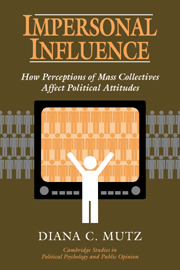
-
Select format
-
- Publisher:
- Cambridge University Press
- Publication date:
- 05 June 2012
- 28 November 1998
- ISBN:
- 9781139175074
- 9780521637268
- Dimensions:
- Weight & Pages:
- Dimensions:
- (228 x 152 mm)
- Weight & Pages:
- 0.543kg, 356 Pages
You may already have access via personal or institutional login
Book description
People's perceptions of the attitudes and experiences of mass collectives are an increasingly important force in contemporary political life. In Impersonal Influence, Mutz goes beyond simply providing examples of how impersonal influence matters in the political process to provide a micro-level understanding of why information about distant and impersonal others often influence people's political attitudes and behaviors. Impersonal Influence is worthy of attention both from the standpoint of its impact on contemporary politics, and because of its potential to expand the boundaries of our understanding of social influence processes, and media's relation to them. The book's conclusions do not exonerate media from the effects of inaccurate portrayals of collective experience or opinion, but they suggest that the ways in which people are influenced by these perceptions are in themselves, not so much deleterious to democracy as absolutely necessary to promoting accountability in a large scale society.
Contents
Metrics
Altmetric attention score
Full text views
Full text views help Loading metrics...
Loading metrics...
* Views captured on Cambridge Core between #date#. This data will be updated every 24 hours.
Usage data cannot currently be displayed.
Accessibility standard: Unknown
Why this information is here
This section outlines the accessibility features of this content - including support for screen readers, full keyboard navigation and high-contrast display options. This may not be relevant for you.
Accessibility Information
Accessibility compliance for the PDF of this book is currently unknown and may be updated in the future.


